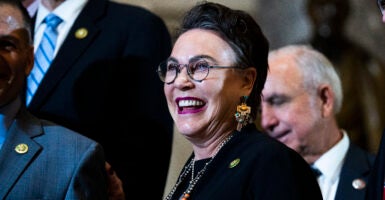A House committee advanced a measure to repeal President Joe Biden’s executive order involving federal agencies in election administration and to require more transparency.
The House Administration Committee on Thursday passed several election-related measures, including the Safeguarding Electoral Integrity Act of 2023, to stop Biden’s Executive Order 14019, which called for federal agencies to partner with private “voter advocacy groups” and develop “strategic plans.”
The bill also requires every plan made under the executive order to be submitted to Congress for review. Since the executive order was put into place, the House Administration Committee, in conjunction with several other committees, sent letters to 12 federal agencies asking for information relating to their implementation of the executive order.
No Biden administration agency has responded to congressional inquiries, according to Republicans.
The legislation, sponsored by Rep. Harriet Hageman, R-Wyo.—who isn’t a House Administration Committee member—passed the committee on a 5-4 party-line vote.
“The electoral process is one of the most important features of our republic,” Hageman said in a statement. “We cannot permit the Biden administration to tamper with it as they continue violating our Constitution on a daily basis.”
The bill would shed greater scrutiny on what has been a secretive executive order. However, it isn’t likely to become law. If it passes the full Republican-controlled House, it has almost no chance of passing a Democrat-controlled Senate, and certainly no chance of getting Biden’s signature.
Under Biden’s executive order, the Internal Revenue Service, the Obamacare exchanges, and U.S. Bureau of Prisons have been among the agencies active in promoting voting, according to a report by a coalition of liberal groups led by the Leadership Conference on Civil and Human Rights last spring, when the order was 2 years old.
Rep. Barry Loudermilk, R-Ga., said the bill “would repeal this executive order and roll back yet another attempt by the Democrats to expand the reach of the federal government into elections.”
“The Department of Labor and the Department of Interior, for example, have no statutory or logical role in voter registration. Yet, this executive order asks them to develop new voter-registration activities for which they are not equipped, limiting the agencies’ ability to complete its actual responsibility,” Loudermilk added. “Instead of propping up new federal programs to register voters, the federal government should look to the agency that is already tasked with assisting in voter-registration efforts, the Election Assistance Commission.”
Democrats on the committee opposed the legislation and praised the Biden executive order.
“The bill itself is beyond ridiculous, and it is deeply cynical. It repeals an executive order by the president promoting voter participation,” said Rep. Joe Morelle, D-N.Y., the ranking member of the committee.
“I struggle to understand the aversion to encouraging people to participate in our democracy. By using existing resources, the executive order does not cost the taxpayer an additional penny,” Morelle said, adding, “I applaud the administration for work on this executive order. The right to vote is cherished in America. It is what makes us the great republic we are.”
Biden administration agencies have thus far refused to be transparent about the strategic plans, or what private organizations the agencies are working with.
The Daily Signal first reported that private organizations included the American Civil Liberties Union, a liberal legal group, and the liberal think tank Demos. The executive order calls for “soliciting and facilitating approved, nonpartisan third-party organizations and state officials to provide voter-registration services on agency premises.”
Biden administration agencies have ignored requests from more than 50 members of Congress and from media outlets for basic information about implementation of Biden’s order on turning out voters. Many congressional Republicans, as well as government watchdog groups, expressed concern about federal agencies’ engaging in partisan political activity in violation of laws, such as the Hatch Act, a law that prohibits federal employees from using work time or resources for partisan political activities.
Biden’s Justice Department also has refused to release its strategic plan, citing “presidential privilege,” in a lawsuit brought by the government watchdog group the Foundation for Government Accountability. Fifteen secretaries of state, states’ top election officials, publicly asked for more transparency from the Biden administration.
Have an opinion about this article? To sound off, please email [email protected], and we’ll consider publishing your edited remarks in our regular “We Hear You” feature. Remember to include the URL or headline of the article plus your name and town and/or state.































